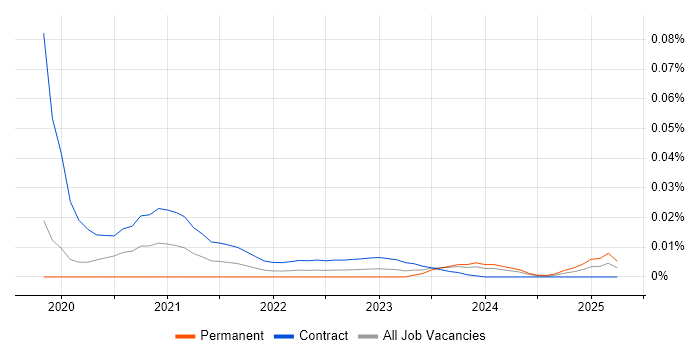Shapes Constraint Language (SHACL)
UK > Work from Home
The table below provides summary statistics for permanent remote or hybrid work requiring SHACL skills. It includes a benchmarking guide to the annual salaries offered in vacancies that cited SHACL over the 6 months leading up to 9 May 2025, comparing them to the same period in the previous two years.
| 6 months to 9 May 2025 |
Same period 2024 | Same period 2023 | |
|---|---|---|---|
| Rank | 444 | 587 | - |
| Rank change year-on-year | +143 | - | - |
| Permanent jobs citing SHACL | 1 | 2 | 0 |
| As % of all permanent jobs with a WFH option | 0.006% | 0.006% | - |
| As % of the Programming Languages category | 0.016% | 0.015% | - |
| Number of salaries quoted | 1 | 0 | 0 |
| 10th Percentile | - | - | - |
| 25th Percentile | £85,000 | - | - |
| Median annual salary (50th Percentile) | £90,000 | - | - |
| 75th Percentile | £95,000 | - | - |
| 90th Percentile | - | - | - |
| UK median annual salary | £90,000 | - | - |
All Programming Languages
Work from Home
SHACL falls under the Programming Languages category. For comparison with the information above, the following table provides summary statistics for all permanent job vacancies with remote or hybrid options requiring coding skills.
| Permanent vacancies with a requirement for coding skills | 6,408 | 13,763 | 20,419 |
| As % of all permanent jobs with a WFH option | 38.56% | 40.76% | 49.24% |
| Number of salaries quoted | 4,856 | 11,409 | 15,015 |
| 10th Percentile | £41,250 | £38,750 | £41,000 |
| 25th Percentile | £47,683 | £46,250 | £50,000 |
| Median annual salary (50th Percentile) | £62,500 | £60,000 | £65,000 |
| Median % change year-on-year | +4.17% | -7.69% | +4.00% |
| 75th Percentile | £83,750 | £78,750 | £85,000 |
| 90th Percentile | £111,250 | £100,000 | £105,000 |
| UK median annual salary | £60,000 | £60,000 | £65,000 |
| % change year-on-year | - | -7.69% | +4.00% |
SHACL
Trend for Jobs with a WFH Option
Job vacancies with remote working options citing SHACL as a proportion of all IT jobs advertised.

SHACL
Co-occurring Skills and Capabilities with WFH Options by Category
The follow tables expand on the table above by listing co-occurrences grouped by category. The same employment type, locality and period is covered with up to 20 co-occurrences shown in each of the following categories:
